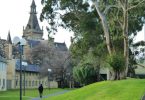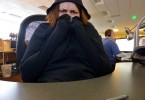
The three guest speakers prepare to address the audience on the pro-Palestine movement during the public forum at the Kaleide Theatre at RMIT University. (Photo by Sham Majid)
The Pro-Palestine movement in Melbourne renewed its call for solidarity and a heightened sense of activism after hosting a public forum at the Kaleide Theatre at RMIT University on October 3, 2013.
Organized by the Coalition Against Israeli Apartheid and Students for Palestine (Victoria), the forum was chaired by a panel of guest speakers, including renowned Professor Emeritus Stuart Rees, Director of the Sydney Peace Foundation at the University of Sydney.
The Students for Palestine campaign group also launched their new print publication called “Intifada”- a book filled with literature pieces and essays featuring student activism.
Professor Rees, who addressed the audience on the history of dissent, civil activism and the oppression of the Palestinian people, said the forum was an ideal platform for people to engage with one another on common issues.
“Even if it was only two people having a conversation, the most important thing is that you are making a connection with one another and having an exchange,” says Professor Rees.
“It is important for universities to bring together people from all walks of life and that is why I came here all the way from Sydney.”
Professor Rees said universities possess the uncanny knack of galvanizing students into activism.
“Students of every kind know when there is injustice and they usually protest and show their solidarity which leads to changes,” he says.
“Universities can be a hub for change and student activism and that can be the reason why sometimes universities try and close down some forms of activism.”
Naomi Farmer, one of the guest speakers who was also among the 19 activists who were arrested outside the Max Brenner outlet at Queen Victoria Mall in 2011, said the issue of Palestine was often portrayed indifferently by the Australian media.
“Palestine is a question mostly obscured by the Australian media,” says Miss Farmer, a post graduate international relations student at La Trobe University.
“However, students are important focal points for activism as they are younger and have not been grounded yet and are more idealistic and open to change.”
Sawsan Hassan, one of the co-founder of the Students for Palestine campaign group in La Trobe University, said the forum allowed interested participants to keep a close eye on proceedings in Palestine.
“The forum aims to build awareness about the oppression Palestinians face and it also sends a message to the Australian government who are supporters of Israel,” says Miss Hassan.
“The building of illegal resettlements and the economic siege of Gaza are some of the examples of the Palestinian oppression.”
“There are many people who support the Palestinian movement and this campaign allows us to get different people together to be more aware of such global developments to participate in future rallies or forums.”
Oliver Garlick, a physics student at the University of Melbourne and editor and photographer of “Intifada”, says he hopes the younger generation will be drawn towards global issues.
“This publication helps to keep people involved in things that are happening in the real world and strengthens the aspect of campaigning in Australia, particularly with students,” says Mr Garlick.
“The purpose of the book is to engage with people on a different level to take an interest in the pro-Palestine movement and the publication is a combination of rich aesthetics and content.”
Michael Guy, who attended the forum, believes the event catered specifically to those who had an intimate knowledge of the ongoing Israeli-Palestine struggles.
“It’s an important issue and it isn’t well publicised in the media,” says Mr Guy, who works as a town planning consultant.
“This event is more for people who are already well aware of issues in Palestine but protest movements and rallies are a good way to raise the profile of the issue.”
Ryan Higginson, an arts student at La Trobe University, believes that students should actively champion for human rights causes.
“It’s really important especially that students take a stand on freedom of speech and that we defend our basic right to freedom of expression,” he says.
“We need to use the political education gained from forums to do something concrete with it.”
Jo Ronaldson, the co-convenor for the Coalition Against Israeli Apartheid, says students hold the key to making a difference in global issues.
“I think there are many examples of students playing the catalyst role in social movement and I believe that will be the case in the future,” says Miss Ronaldson.





